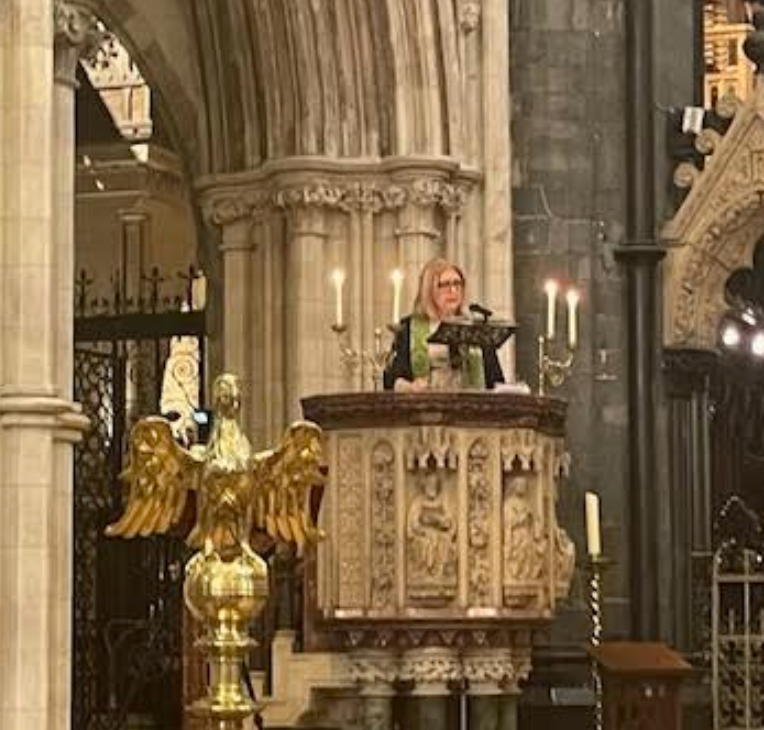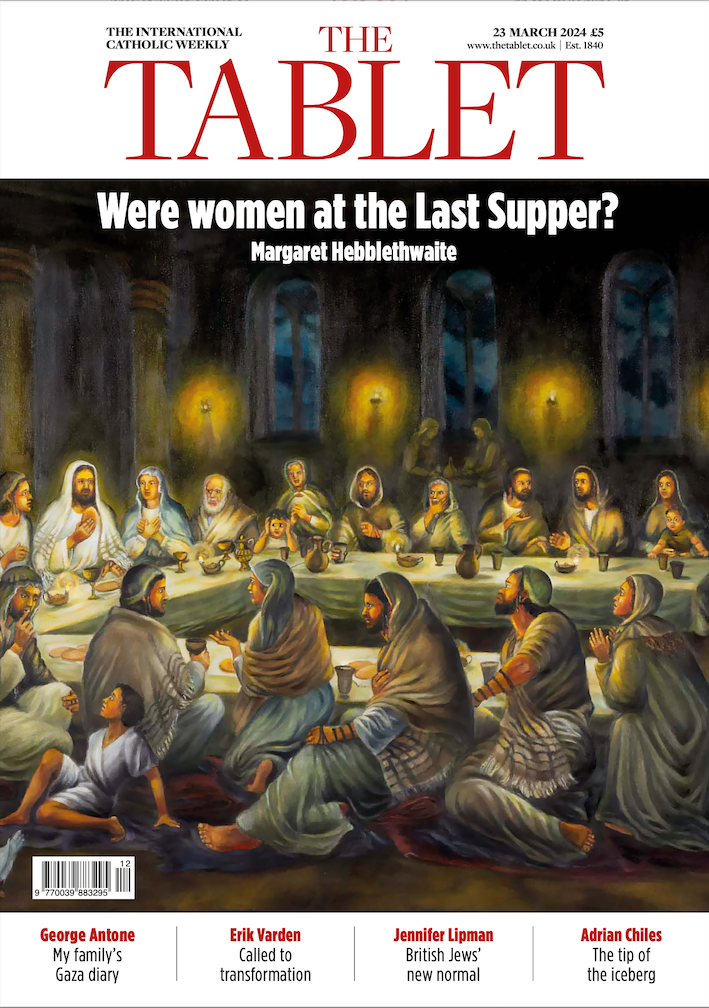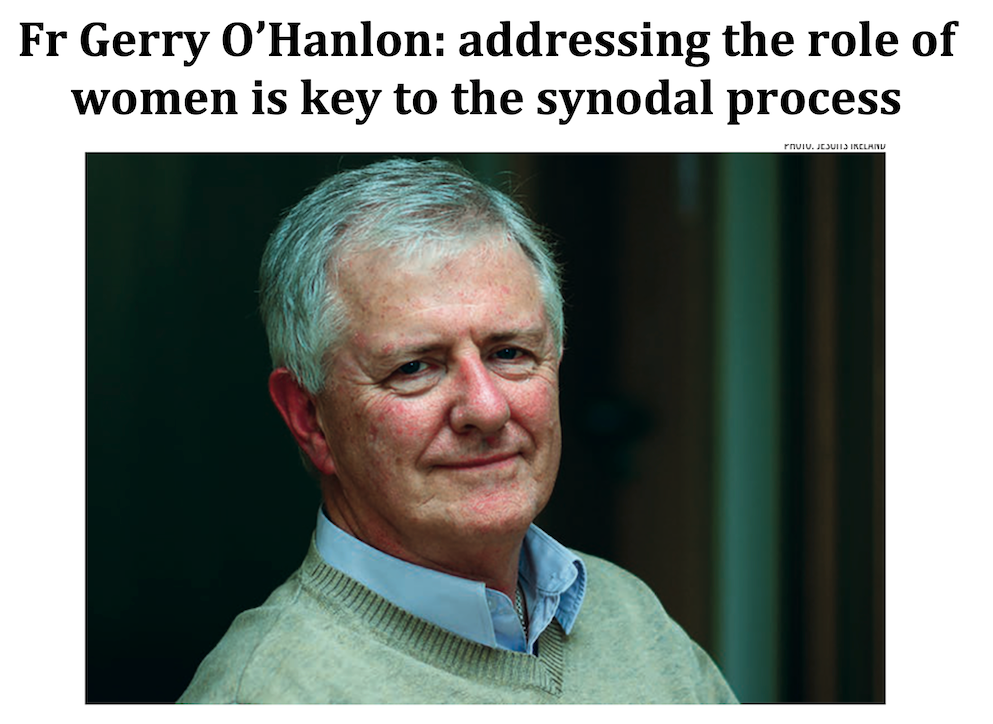Blog Layout
New Archbishop of Dublin
Joe Mulvaney • 14 January 2021
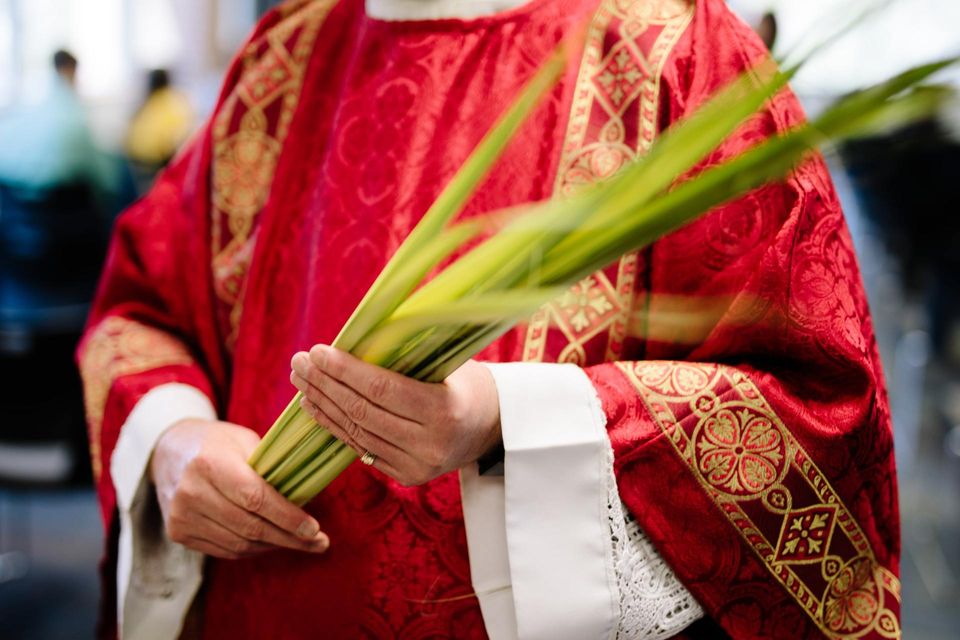
The papers reported in early January about the appointment of the Bishop of Ossory, Dermot Farrell, as the new Archbishop-elect of Dublin. I was aware of an American election but not of one for the Dublin diocese. The baptised People of God in Dublin had no hand, act or vote in his election or selection by the Roman Curia who is the Pope. This is normal clerical practice from the bygone eras of empire, slavery, superstition, and fear. However, it is a foreign and outdated system for Catholics today who value their personal dignity, vote and active participation
in liturgy, ministry and decision making as per the Acts of the Apostles and state of the art governance. In a time of great struggle between democracy and despotism, it appears preferable if the Catholic Church were to model power sharing, synodality, subsidiarity and respect for the Holy Spirit in every person.
I welcome the statement by Bishop Farrell as reported in the Irish Times that he favours women deacons and optional celibacy. I also welcome his honest admission that there is no scriptural basis for the clerical refusal to ordain women and that patriarchal tradition is the only barrier. Those statements are welcome news for those of us practising Catholics who treasure the core Good News of Jesus Christ and wish to transmit same to a new generation. It appears to us that it is not possible to evangelise today in the language of sexism, patriarchy, homophobia, and authoritarianism. Polls have shown over decades that a majority of Irish Catholics disagree with the clerical policy of apartheid for women and refusal to grant justice and equality for women in the leadership, governance, and ministry of the Roman Catholic Church.
Some outdated traditions are poisonous and hinder Christian discipleship. Many traditions or teachings about slavery, antisemitism and inquisition have mostly been laid aside. Patriarchal traditions of entitlement and superiority are gradually being neutralized even though there is still much misogyny and domestic abuse. Clerical traditions of suspicion and fear of women must change soon in favour of positive celebration of sexuality. Bishop Dermot seems worried about the false threat of a split or schism. If the issue of women priests, justice and power sharing splits any church, it is only right that people today should continue to walk away from such outdated patriarchal strongholds.
I very much welcome the synodal policy as promoted by Pope Francis and Bishop Farrell as long as it is not just empty talk or shunted into a siding like the Amazonian Synod. The masters in control may use syrup buzz words such as “listening” and “consultation” but, it is all a sham if the end result remains that lay people and priests have no real say in decision making. There is indeed a great need for open conversation, active listening and honest dialogue in every parish leading to consensus and substantial reform as a matter of urgency. There must be no clerical roadblocks or red lines. It is all a waste of time and a useless charade if the clerics do not allow for serious action and substantial reform of systems, traditions, governance, ministry and narrative.
For much of the past century, there was dreadful misogyny and patriarchal domination in the Republic of Ireland as heavily controlled and influenced by the Roman Curia. There have been many shameful reports about that awful time. Now we are faced with the depressing report into mother and baby homes. There will be apologies and purposes of amendment. However, the patriarchal maltreatment of women and homosexuals continues in our official Catholic Catechism, Canon Law, and traditions. Tragically, this all contributes to ongoing domestic abuse and homophobic bullying in society. Will the next century reports find us Catholics guilty of continued collusion in the oppression of women and homosexuals? Sadly, it is still happening on our watch. We need to speak out for reform or continue to walk away. Catholics have been crying out for reforms, renewal, and reunion for many centuries. That project has been consistently thwarted by the Roman Curia. In the light of that refusal, it is little wonder that people walk away and that plans to reorganise, or close parishes will be unwelcome.
It is good that Bishop Farrell has announced himself as a listener and a beacon of hope and a supporter of Pope Francis. I welcome Bishop Farrell to our diocese. I will listen carefully to his words and observe his actions. I will continue to speak out for reform and will pray for success and every blessing in his ministry among us.
Joe Mulvaney
Dundrum, Dublin 16
Share
Tweet
Share
Mail
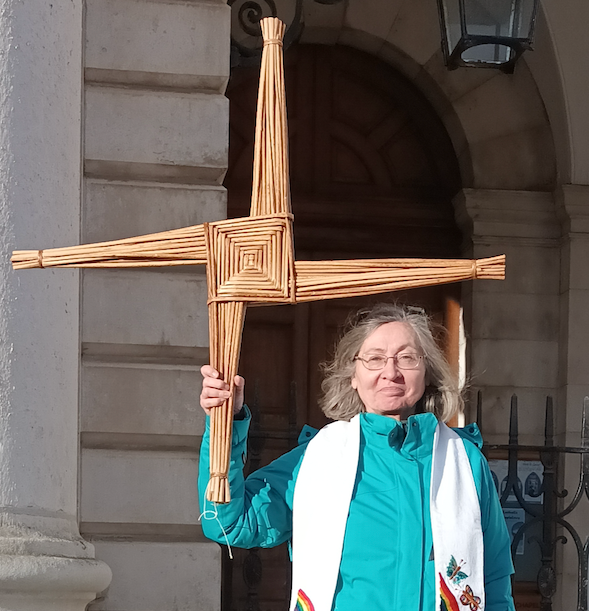
by Soline Humbert
•
25 February 2025
A reflection by Soline Humbert for the Women’s Ordination Conference Retreat “Hidden Springs, Holy Radiance” 9 February 2025 [ see recording on YouTube https://www.youtube.com/watch?v=szP5h1kzEsU ] We have been gathering over the past three days in the presence of Brigid of Kildare, and I am sure she has brought gifts to each one, for my experience is that she is attentive to our needs and very generous with her help. At this stage I just want to share some of my own life journey with Brigid. I first encountered her in 1969 when I came from France to Ireland as a child on holidays to learn English. I went to a small Irish town called Tullow. As it happens it was in Tullow that on the first of February 1807 the order of nuns of St Brigid which had been dissolved at the Reformation, had been refounded by a far-sighted bishop. Symbolically an oak sapling had been brought from Kildare Town, from the church of the oak, to Tullow and planted in the grounds of the Brigidine convent where I took English classes. It was by then a majestic oak tree. It still stands to this day. Coincidentally and somewhat ironically, 1969 was also the year that Pope Paul the 6th removed St Brigid, along with 193 other saints, from the Universal Roman Calendar of saints. The reason being that there wasn’t enough evidence for her existence! That despite the fact she was the most mentioned Irish person in the writings of several centuries after her death... What was true was that her flame had been somehow extinguished, and her importance diminished in a deeply clericalised and patriarchal church as Ireland was at the time. She was in the shadow of St Patrick and very much the secondary patron Saint, reflecting the secondary position of women in general. But change was slowly happening. Having discovered in myself a vocation to the priesthood I eventually co- founded a group for women’s ordination and launched a petition to open all ministries to women in February 1993. At the very same time, which I consider providential, the flame of St Brigid was rekindled by the Brigidine sisters in Kildare Town. Women were stirring after a very long wintertime in the church and in society and becoming more fiery. Brigid with her torch was blazing a way for equality. It is then, and only then, that I came across the story of her ordination as a bishop and I remember my astonishment for I had never read anything like that before, or since, for that matter. Of course, while this fact was mentioned in many of the lives of Brigid going back to the first millennium it had been quietly left out of the pious descriptions of her life which were fed to the people. The way the story is recounted makes it clear that her ordination was considered to be very much the doing of the Holy Spirit. Objections about her gender were voiced but powerless to negate what God had done. It reminds me very much of the passage in the Acts of the Apostles when St Peter is amazed to discover that the Holy Spirit has descended on Cornelius, a gentile, and which leads him to conclude that “God has no favourites”. Brigid’s episcopal ordination at the hands of a bishop overcome by the Spirit is also a powerful affirmation that when it comes to ordination God has no favourite gender. Her ordination’s divine origin shows that Brigid was a bishop because God ordained it, and her. A very subversive truth our Church has yet to learn... As we campaigned for women’s ordination we made sure that this episode from Brigid’s life was brought into the open, again and again, despite clerical efforts to dismiss this dangerous historical memory as pure legend and keep it buried. Interestingly when the Anglican Church of Ireland, (Episcopalian) ordained their first woman bishop in 2013 it was to the diocese of Meath and Kildare! A very symbolic act. I have often gone to St Brigid’s Well in Kildare, a little oasis of peace, to spend some time with Brigid and re-source myself by the gently flowing water. After the First Women’s Ordination Worldwide Dublin international Conference in 2001 I went there again on the anniversary of my baptism and I hung my purple stole on a tree overlooking the well. I had worn that stole for many years as a sign of waiting. From now on I would wear stoles of other colours. And a few years ago, I found myself back in Tullow, as a guest speaker at the invitation of the Brigidine sisters for an international celebration. It was very moving to be able to speak of my calling to priesthood in the place where the order of St Brigid had been revived and where I had first come as a child half a century beforehand! That day I sensed very much the presence of Brigid the bishop and I was filled with joy and gratitude. In some ways we can say St Brigid has risen up and is leading the way for women to rise up. Although a woman in what was very much a man’s world and a man’s church, Brigid exudes a remarkable confidence in her being, in her words and in her actions. No doubt that confidence was rooted in a deeply contemplative life nurtured by prayer. “From the moment I first knew God, I have never let him out of my mind, and I never shall”. She embodies the authority which stems from being filled by the Spirit and a leadership at the service of peace, justice, hospitality to the strangers, charity to the poor and marginalised, reconciliation, healing and harmony with creation and care of the earth. The two Scripture readings we have just heard are very fitting for she was renowned for her practical care and generosity to those in need or suffering. Like Christ, she went around doing good. I must not be the only one who saw and heard in Episcopalian bishop Mariann Budde’s recent words the spirit of St Brigid as she used her God- given authority to plead for mercy for the people in vulnerable situations in the face of unbounded cruelty. Brigid is a bold, dynamic presence. She is said to be a woman of the threshold, of liminal places, and she is a sure guide for our times when we also are in transition on the threshold of a new church and a new world too. She calls to us to step boldly forward with our torches burning brightly, bringing the light and warmth of God’s Love to a world gone cold in the grip of darkness and despair. Her life reminds us that with “God nothing is impossible” and to expect miracles. I shall end on a light- hearted note: I went on pilgrimage to St Brigid’s Well and Solas Bhride in Kildare last Tuesday to prepare for this retreat. On the way back from the well and driving through the wide expanse of the Curragh where thousands of sheep graze freely I started seeing a multitude of rainbows. It reminded me of one of the many whimsical stories about Brigid: Caught in a rainstorm, she hangs her mantle on a sunbeam to dry. Dripping from its edges, colourful rainbows form in the water droplets, and her mantle is ‘bright’ with colour. Lady, from winter’s dark, Star of Imbolc, rise! Dance across our threshold: Scattering warm laughter Seeds of hospitality, Tolerance, forgiveness! Return again to the folk: You the Spring we yearn for! (Tom Hamill)

Women are a problem for the Catholic Church, an institution with ingrained misogyny - Soline Humbert
by Colm Holmes
•
4 November 2024
Papal plámás is no substitute for an end to discrimination against women
About us
We are working to develop inclusive communities based on our 6 Aims, while being open to engage with all sections of the church about our lives in the church today.
Contact Info

by Soline Humbert
•
25 February 2025
A reflection by Soline Humbert for the Women’s Ordination Conference Retreat “Hidden Springs, Holy Radiance” 9 February 2025 [ see recording on YouTube https://www.youtube.com/watch?v=szP5h1kzEsU ] We have been gathering over the past three days in the presence of Brigid of Kildare, and I am sure she has brought gifts to each one, for my experience is that she is attentive to our needs and very generous with her help. At this stage I just want to share some of my own life journey with Brigid. I first encountered her in 1969 when I came from France to Ireland as a child on holidays to learn English. I went to a small Irish town called Tullow. As it happens it was in Tullow that on the first of February 1807 the order of nuns of St Brigid which had been dissolved at the Reformation, had been refounded by a far-sighted bishop. Symbolically an oak sapling had been brought from Kildare Town, from the church of the oak, to Tullow and planted in the grounds of the Brigidine convent where I took English classes. It was by then a majestic oak tree. It still stands to this day. Coincidentally and somewhat ironically, 1969 was also the year that Pope Paul the 6th removed St Brigid, along with 193 other saints, from the Universal Roman Calendar of saints. The reason being that there wasn’t enough evidence for her existence! That despite the fact she was the most mentioned Irish person in the writings of several centuries after her death... What was true was that her flame had been somehow extinguished, and her importance diminished in a deeply clericalised and patriarchal church as Ireland was at the time. She was in the shadow of St Patrick and very much the secondary patron Saint, reflecting the secondary position of women in general. But change was slowly happening. Having discovered in myself a vocation to the priesthood I eventually co- founded a group for women’s ordination and launched a petition to open all ministries to women in February 1993. At the very same time, which I consider providential, the flame of St Brigid was rekindled by the Brigidine sisters in Kildare Town. Women were stirring after a very long wintertime in the church and in society and becoming more fiery. Brigid with her torch was blazing a way for equality. It is then, and only then, that I came across the story of her ordination as a bishop and I remember my astonishment for I had never read anything like that before, or since, for that matter. Of course, while this fact was mentioned in many of the lives of Brigid going back to the first millennium it had been quietly left out of the pious descriptions of her life which were fed to the people. The way the story is recounted makes it clear that her ordination was considered to be very much the doing of the Holy Spirit. Objections about her gender were voiced but powerless to negate what God had done. It reminds me very much of the passage in the Acts of the Apostles when St Peter is amazed to discover that the Holy Spirit has descended on Cornelius, a gentile, and which leads him to conclude that “God has no favourites”. Brigid’s episcopal ordination at the hands of a bishop overcome by the Spirit is also a powerful affirmation that when it comes to ordination God has no favourite gender. Her ordination’s divine origin shows that Brigid was a bishop because God ordained it, and her. A very subversive truth our Church has yet to learn... As we campaigned for women’s ordination we made sure that this episode from Brigid’s life was brought into the open, again and again, despite clerical efforts to dismiss this dangerous historical memory as pure legend and keep it buried. Interestingly when the Anglican Church of Ireland, (Episcopalian) ordained their first woman bishop in 2013 it was to the diocese of Meath and Kildare! A very symbolic act. I have often gone to St Brigid’s Well in Kildare, a little oasis of peace, to spend some time with Brigid and re-source myself by the gently flowing water. After the First Women’s Ordination Worldwide Dublin international Conference in 2001 I went there again on the anniversary of my baptism and I hung my purple stole on a tree overlooking the well. I had worn that stole for many years as a sign of waiting. From now on I would wear stoles of other colours. And a few years ago, I found myself back in Tullow, as a guest speaker at the invitation of the Brigidine sisters for an international celebration. It was very moving to be able to speak of my calling to priesthood in the place where the order of St Brigid had been revived and where I had first come as a child half a century beforehand! That day I sensed very much the presence of Brigid the bishop and I was filled with joy and gratitude. In some ways we can say St Brigid has risen up and is leading the way for women to rise up. Although a woman in what was very much a man’s world and a man’s church, Brigid exudes a remarkable confidence in her being, in her words and in her actions. No doubt that confidence was rooted in a deeply contemplative life nurtured by prayer. “From the moment I first knew God, I have never let him out of my mind, and I never shall”. She embodies the authority which stems from being filled by the Spirit and a leadership at the service of peace, justice, hospitality to the strangers, charity to the poor and marginalised, reconciliation, healing and harmony with creation and care of the earth. The two Scripture readings we have just heard are very fitting for she was renowned for her practical care and generosity to those in need or suffering. Like Christ, she went around doing good. I must not be the only one who saw and heard in Episcopalian bishop Mariann Budde’s recent words the spirit of St Brigid as she used her God- given authority to plead for mercy for the people in vulnerable situations in the face of unbounded cruelty. Brigid is a bold, dynamic presence. She is said to be a woman of the threshold, of liminal places, and she is a sure guide for our times when we also are in transition on the threshold of a new church and a new world too. She calls to us to step boldly forward with our torches burning brightly, bringing the light and warmth of God’s Love to a world gone cold in the grip of darkness and despair. Her life reminds us that with “God nothing is impossible” and to expect miracles. I shall end on a light- hearted note: I went on pilgrimage to St Brigid’s Well and Solas Bhride in Kildare last Tuesday to prepare for this retreat. On the way back from the well and driving through the wide expanse of the Curragh where thousands of sheep graze freely I started seeing a multitude of rainbows. It reminded me of one of the many whimsical stories about Brigid: Caught in a rainstorm, she hangs her mantle on a sunbeam to dry. Dripping from its edges, colourful rainbows form in the water droplets, and her mantle is ‘bright’ with colour. Lady, from winter’s dark, Star of Imbolc, rise! Dance across our threshold: Scattering warm laughter Seeds of hospitality, Tolerance, forgiveness! Return again to the folk: You the Spring we yearn for! (Tom Hamill)

Women are a problem for the Catholic Church, an institution with ingrained misogyny - Soline Humbert
by Colm Holmes
•
4 November 2024
Papal plámás is no substitute for an end to discrimination against women
00353 86 8151054- John
info@wearechurchireland.ie
For merchandise:
We Are Church Ireland
C/O 49 Rockfield Avenue,
Perrystown,
Dublin 12.
D12H6F6
Ireland
We Are Church Ireland
C/O 49 Rockfield Avenue,
Perrystown,
Dublin 12.
D12H6F6
Ireland







